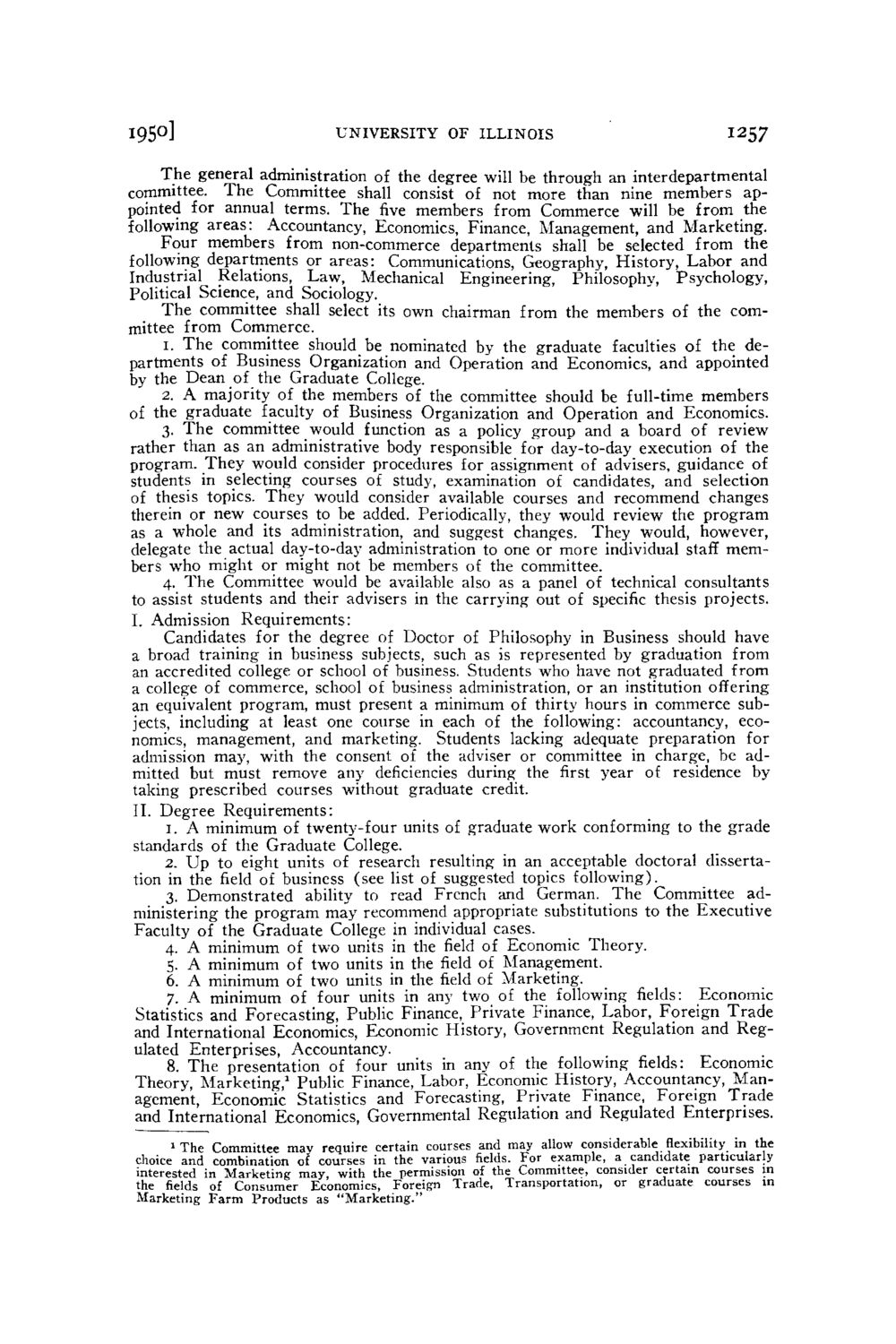| |
| |
Caption: Board of Trustees Minutes - 1950
This is a reduced-resolution page image for fast online browsing.

EXTRACTED TEXT FROM PAGE:
i95°l U N I V E R S I T Y OF I L L I N O I S 1257 The general administration of the degree will be through an interdepartmental committee. The Committee shall consist of not more than nine members appointed for annual terms. The five members from Commerce will be from the following areas: Accountancy, Economics, Finance, Management, and Marketing. Four members from non-commerce departments shall be selected from the following departments or areas: Communications, Geography, History, Labor and Industrial Relations, Law, Mechanical Engineering, Philosophy, Psychology, Political Science, and Sociology. The committee shall select its own chairman from the members of the committee from Commerce. 1. The committee should be nominated by the graduate faculties of the departments of Business Organization and Operation and Economics, and appointed by the Dean of the Graduate College. 2. A majority of the members of the committee should be full-time members of the graduate faculty of Business Organization and Operation and Economics. 3. The committee would function as a policy group and a board of review rather than as an administrative body responsible for day-to-day execution of the program. They would consider procedures for assignment of advisers, guidance of students in selecting courses of study, examination of candidates, and selection of thesis topics. They would consider available courses and recommend changes therein or new courses to be added. Periodically, they would review the program as a whole and its administration, and suggest changes. They would, however, delegate the actual day-to-day administration to one or more individual staff members who might or might not be members of the committee. 4. The Committee would be available also as a panel of technical consultants to assist students and their advisers in the carrying out of specific thesis projects. I. Admission Requirements: Candidates for the degree of Doctor of Philosophy in Business should have a broad training in business subjects, such as is represented by graduation from an accredited college or school of business. Students who have not graduated from a college of commerce, school of business administration, or an institution offering an equivalent program, must present a minimum of thirty hours in commerce subjects, including at least one course in each of the following: accountancy, economics, management, and marketing. Students lacking adequate preparation for admission may, with the consent of the adviser or committee in charge, be admitted but must remove any deficiencies during the first year of residence by taking prescribed courses without graduate credit. II. Degree Requirements: 1. A minimum of twenty-four units of graduate work conforming to the grade standards of the Graduate College. 2. Up to eight units of research resulting in an acceptable doctoral dissertation in the field of business (see list of suggested topics following). 3. Demonstrated ability to read French and German. The Committee administering the program may recommend appropriate substitutions to the Executive Faculty of the Graduate College in individual cases. 4. A minimum of two units in the field of Economic Theory. 5. A minimum of two units in the field of Management. 6. A minimum of two units in the field of Marketing. 7. A minimum of four units in any two of the following fields: Economic Statistics and Forecasting, Public Finance, Private Finance, Labor, Foreign Trade and International Economics, Economic History, Government Regulation and Regulated Enterprises, Accountancy. 8. The presentation of four units in any of the following fields: Economic Theory, Marketing, 1 Public Finance, Labor, Economic History, Accountancy, Management, Economic Statistics and Forecasting, Private Finance, Foreign Trade and International Economics, Governmental Regulation and Regulated Enterprises. ' T h e Committee may require certain courses and may allow considerable flexibility in the choice and combination of courses in the various fields. For example, a candidate particularly interested in Marketing may, with the permission of the Committee, consider certain courses in the fields of Consumer Economics, Foreign Trade, Transportation, or graduate courses in Marketing Farm Products as "Marketing."
| |